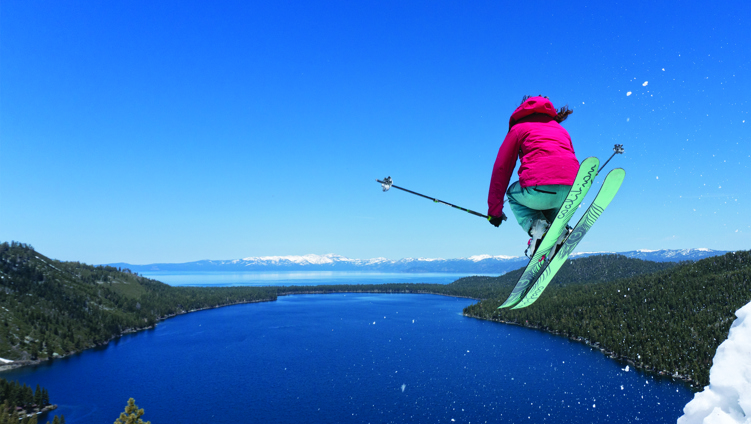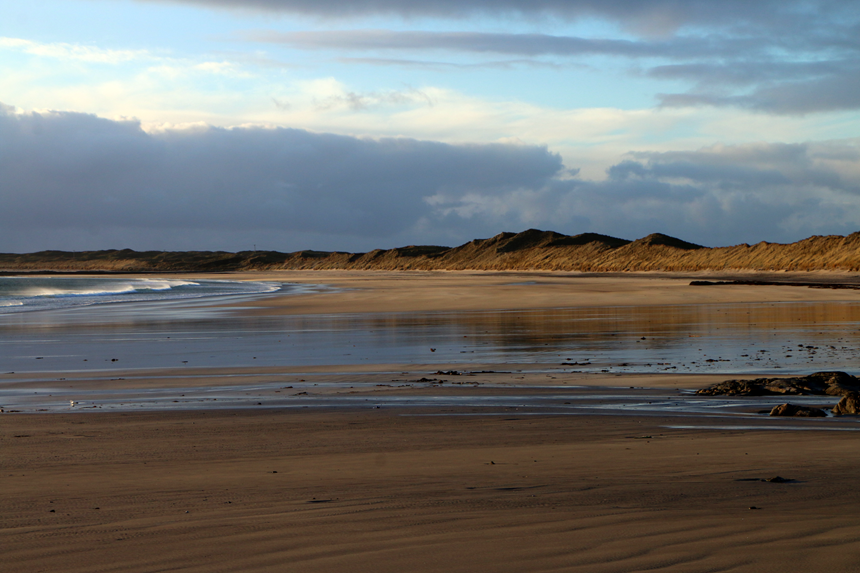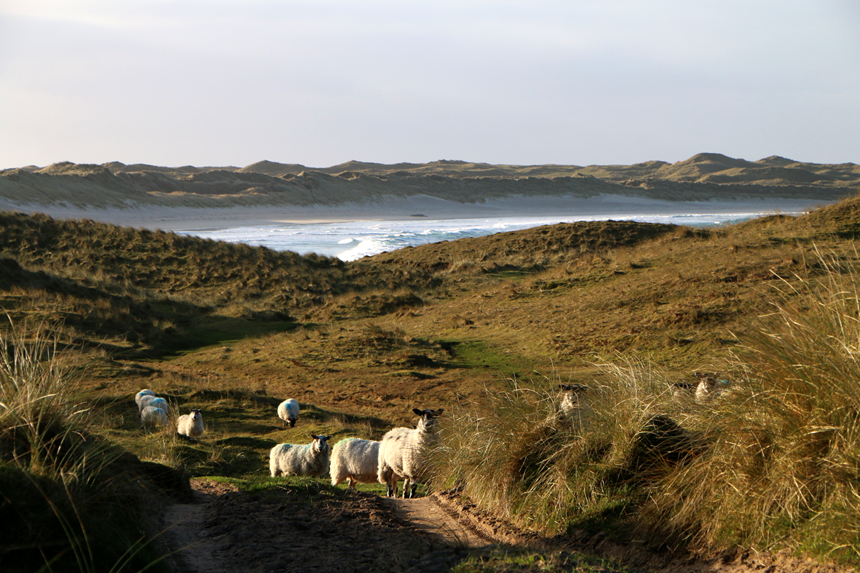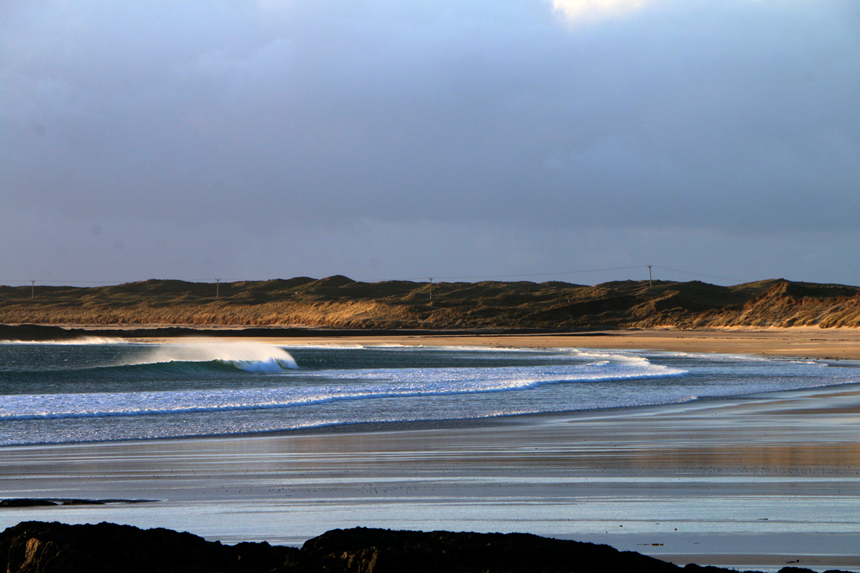When David Lyons started surfing on the Hebridean island of Coll, a close affinity with the ocean was born - one that led inevitably to the blight of plastic pollution. In this piece he explores the activism of the surfing community in response.

When David Lyons started surfing on the Hebridean island of Coll, a close affinity with the ocean was born - one that led inevitably to the blight of plastic pollution. In this piece he explores the activism of the surfing community in response.
Before I started surfing I never imagined that under the right conditions, with the wind whipping directly off shore, clear skies above and the sun at the perfect angle, the sea could leave behind a trail of rainbows, arching through the spray off the back of the waves. That crisp, spring day, surfing was quickly relegated below sitting on my board out back and enjoying the show that nature was putting on.
I learned to surf on the Hebridean island of Coll, where I lived for three years after university whilst working for a charity based there. By the end the first winter, with a good four months of surfing under our belts, my friends and I thought we were getting the hang of things. We could read the forecast to know which breaks would be working, when it would be too messy to bother and how big is too big (the latter being a quick and harsh lesson delivered when my friend and I were simultaneously smashed into the sand by the first, and last, wave of the day).
Coll, by Ross of Coll

After one successful January session, we went to the island’s pub, feeling elated and a tad pleased with ourselves, to celebrate having surfed through the worst of the winter. Our friends, who ran a fishing boat off the island, took great delight in informing us that the water temperature was a few months behind the air temperature and would continue to get colder until April. We still had a lot to learn.
For those who have been, the beaches of the Hebrides hold a very specific set of associations: white sand, empty, pristine. Coll has 30 beaches along its coastline, which is almost greedy for an island thirteen miles by three miles long and with a population of under 200. In the summer, when the island’s population almost doubles with tourists and “summer swallows” (people who own houses on Coll but migrate to warmer climes during the winter) you’ll be unlucky if there are ten other people on any given beach. In the winter, you can spend hours on the beaches without seeing anyone. In the three years I surfed on Coll I never saw anyone on the waves other than the friends I’d gone out with.
All this creates an idyllic image of our Hebridean surfing experience, and certainly on days when we were surfing with views of Skye’s snow-capped peaks in the distance and seals playing in the water around us, it felt that way. But as you learn to surf and you develop an intimate knowledge of your local breaks, you start to notice how the beaches change week-by-week. Unfortunately, becoming more familiar with beaches and seeing them in more detail brings one of surfing’s starkest lessons: becoming increasingly aware of just how much plastic there is on those pristine-seeming stretches of sand.
Coll, by Ross of Coll

Project Trust, the charity that I was working for on Coll, organised beach cleans, so I would occasionally drive a group of volunteers in an old Land Rover to one of the beaches and spend the morning picking up plastic. Over the course of a few hours we would fill the Land Rover and drive its contents to the island’s dump, making several round tips every beach clean. At the time, this process felt cathartic – like we were making a difference to a very evident problem. But then you’re back at the same beach a few months later, and you fill up the Land Rover a few more times, and your heart sinks as you realise that the plastic will keep coming. Picking up litter is tackling the symptom, not curing the disease.
The endless battle against plastic we experienced on Coll has been brought firmly into the public consciousness this summer through widespread reports of beaches being left awash with litter. On social media, local communities have spoken out of their despair at cleaning a beach one day, only for it to be trashed again the next. The question for activists is, if individual actions like beach cleans are fighting an endless battle, how can we make a lasting impact on plastic pollution?
Coll, by Ross of Coll

Ocean activist charity Surfers Against Sewage (SAS) encourages “all surfers [to] take stewardship of the surfing environment and carry out actions to preserve and improve the places we live, surf and love.” For SAS, the answer to taking your activism “beyond the beach clean” is coordinated campaigns for change. Amy Slack, Head of Campaigns and Policy at SAS, says: “It’s time to fight back and demand better policy, better business practices and better systems that allow us to rid the ocean and natural environments of plastic pollution.”
Through nationwide beach, river and mountain cleans, SAS’ activists become citizen scientists, collecting data on plastic pollution across the UK so the companies producing the most pollution can be identified. This summer SAS’ Return to Offender campaign called companies out on social media when their products were collected, engaging brands in public discussion about their plastic-reduction policies. These campaigns shift the focus from clearing up plastic to preventing it being made in the first place.
SAS’ fight against plastic and pollution is delicately poised. On top of the onslaught of single-use plastic brought on by the COVID-19 pandemic (the SAS website cites reports saying the Mediterranean will soon contain more disposable masks than jellyfish), this month Defra reported that all England’s rivers have failed to meet legally binding pollution quality tests. This autumn the UK’s Environment Bill is passing through Parliament. SAS say the legislation in the bill currently is mostly weaker than EU regulations and lacks teeth because it contains no legal obligation for the government to follow independent expert advice. The Environment Bill’s stated aim of “improving the natural environment” sits uncomfortably with Boris Johnson’s economic growth strategy to “build, build, build.”
But in the face of this adversity, there is evidence that by bringing together communities from the Hebrides to Cornwall, SAS’s activism is driving change. This month the supermarket Iceland joined forces with SAS, Greenpeace, Friends of the Earth and A Plastic Planet to call on business to commit to transparency in reporting their plastic usage, and for the Government to mandate plastic reporting and pollution-reduction targets through the Environment Bill.
Hugo Tagholm, CEO of SAS, said: “We believe that setting plastic-pollution-reduction targets in the Environment Bill will help drive the action required at individual, business and community levels to stem the plastic tide. We urgently need measures that correspond with these targets, including transparent reporting from all businesses, reuse incentives and a deposit return system on plastic bottles. We have a once-in-a-generation opportunity to deliver world-beating legislation to end plastic pollution once and for all.”

